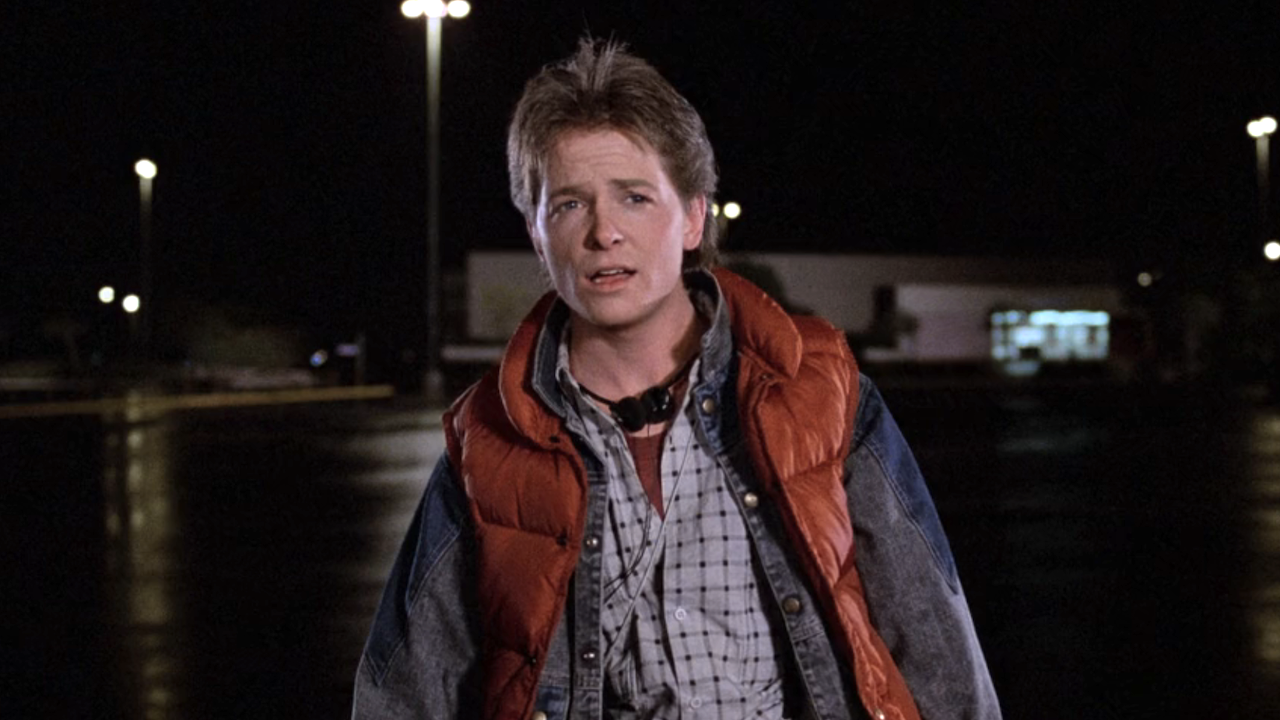Interview: The Cast And Filmmakers Of The Next Three Days
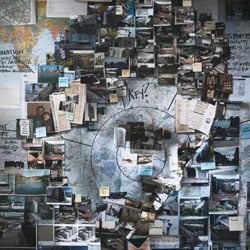
When you hear about a film in which Russell Crowe stars as a man who tries to break his wife out of prison, odds are, you expect to see a standard action thriller. That’s far from the case in The Next Three Days. Crowe’s character is a well-meaning English teacher and while he does attempt to spring his wife, Lara (Elizabeth Banks), the process is far more thoughtful and methodical than you’d expect.
Of course The Next Three Days isn’t devoid of action, but writer-director Paul Haggis certainly aimed to make this one more character driven rather than your basic thrill ride. Taking a cue from the French film Pour Elle, the two-time Academy Award winner developed a script that aims to create suspense and tension through character exposition and the gravity of his situation.
In honor of The Next Three Days’ November 19th release, Haggis, his two stars and producer Michael Nozik assembled to shed light on the filmmaking process, discuss the key concepts of the story and to have a little fun while they were at it. Check out all the details from Banks’ experience in Allegheny County Jail doing research to Crowe’s thoughts on his co-cast and to get a little taste of what a Russell Crowe/Paul Haggis comedy show might be like in the interview below.
Russell, when you were working on this character, was it a challenge to transform him from mild mannered ordinary guy to somebody who can pull off this huge heist in terms of the audience credibility?
Paul Haggis: I think that the tension comes the fact that we -
Russell Crowe: [whispering] I think he was asking me mate. [Laughs]
Haggis: I think the tension comes as a preamble to what Russell is going to say in the fact that we don’t know if he’s going to pull it off or not and you cast an actor like Russell Crowe because he’s such a fine actor and you can forget about roles like Gladiator and Robin Hood in the first two minutes of the film and look and go, ‘Oh my god. The poor sap. He’s never going to really do this.’ Russell, what do you think?
Your Daily Blend of Entertainment News
Crowe: Thank you Paul. We’ll be touring Europe soon, Paul and I. I think it’s about belief. It’s kind of simple. If the audience is seeing this guy believing in what he’s doing then they might not agree with what he’s doing, but he’s obviously got an unshakable belief in his wife and it transfers into how he researches what he needs to research and then when he hits those hurdles and things don’t work out properly, the mere fact that he keeps going. I think that the transformation, if there is one, is in his persistence.
Russell, in this film we can tell just by your facial expression what was going on? Was this harder for you than a classic action film?
Haggis: Where you use no facial expressions. [Laughs]
Elizabeth Banks: Where you let the swords do the acting for you.
Crowe: I think Elizabeth should answer that one. Ladies and gentlemen, Elizabeth Banks.
Banks: Having not ever played a Gladiator or -
Crowe: Except on Halloween.
Banks: Not even then actually. I don’t know if it was harder. I have no idea. He seems to be just as devoted and dedicated to the seriousness of the work at every moment and I’m very grateful.
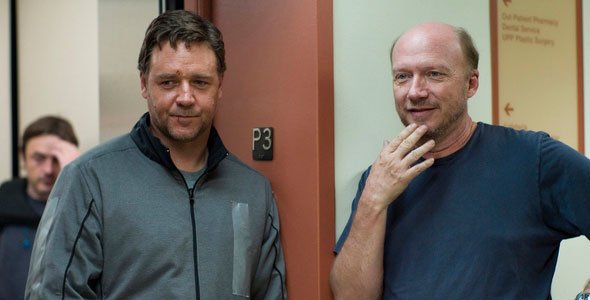
Elizabeth, we’ve seen you do a lot of comedy recently, so why did you choose to do something like this, something more dramatic?
Haggis: Can I answer that? Because we felt it could be a lot funnier and it just turned out not to be.
Banks: [Laughs] Yes, and I was actually written comedically and I screwed up. [Laughs] I’m a classically trained actor; I went to drama school. I fell into comedy. It was my very first job as an actor actually was in a comedy called Wet Hot American Summer and I really enjoy making comedies, but I was so happy that Paul sort of called me one day and said, ‘I think you can do this.’ I think a lot of the best actors have great comedic chops as well. I wanted there to be a lightness to Lara so that you believe that this man would want her in his life forever. So I think that’s partly why I ended up in this job.
Haggis: Because of your lightness? No, you did it because you’re a damn skilled actor, that’s why.
Russell, in a world where there are so many divorces –
Crowe: Cue violins!
Where’d you look for inspiration for your role of such a loving and devoted husband?
Crowe: On the 10th of November my parents will celebrate their 49th wedding anniversary, so I’ve been very lucky and blessed in that way that I’ve grown up in a household which is all about commitment, true, hard at times and the good, you know? It was one of the things that really attracted me to the character that unshakeable belief that we were talking about before. I was away from my own family for 87 days in order to make this film. So there was a big distance between me and my own family so that made a lot of the things we were doing in the script come into a very stark reality or a stark light. A lot of the time, and I know this simple, but I take the inspiration that I need for what I’m doing from the thing that I’m doing. It’s a really well written script.
A large part of this film is founded on an understanding of police procedures and prison routine. Elizabeth and Russell, when you saw the whole process, what did you think of the whole concept and process?
Banks: I remember having a discussion with Paul where he told me that you can just Google how to break out of prison and like 400,000 come up. The fact of the matter is that people do break out, it happens all the time; you can learn how to do it. I think the great thing that we’ve done in this movie is that it ultimately comes down to you can learn how to do it, it’s all about the bravery of doing it. Am I brave enough to actually risk it and do it and risk the consequences of making it happen? I think that’s the larger message of the whole movie, right? That we can control our destinies and we can take action. It just takes this regular guy that goes, ‘ I’m going to be brave enough to actually change the fate of the people I care about.’
Crowe: On behalf of Lionsgate Films and Hwy 61 Productions, I’d just like to have a disclaimer here right now. We’re not recommending that anybody tries anything that they see in the movie.
Michael can you talk about some of the challenges from the producer’s side?
Michael Nozik: The city of Pittsburgh was incredibly helpful in shutting the city down for us and allowing us to control the subways, the bridges, the tunnels at various hours of the day and night to execute the chase sequence. The challenge was that much of this chase sequence takes place over the course of a set number of hours, a day or two. You’ve got one day and one evening of the chase and we shot it over a course of a number of weeks so all of the light and the weather had to match and it was always a challenge, in a city like Pittsburgh which has ever-changing weather, to match the light, weather and consistency to make it all seem like it was one day. One third of the movie was one day of the movie.
Banks: Also, they hit us with a fire truck.
Haggis: But that was not on purpose. [I said,] ‘Russell, ‘This shot would be a lot better if we weren’t towing it, so can you drive through this tunnel by yourself?’ We were around traffic so I go, ‘Do you mind?’ He said, ‘No.’ And I said, ‘Well, and as you’re going, would you mind taking off your jacket in the middle?’ ‘Of course I’ll do that.’ And then, of course, I say, ‘Action,’ and -
Banks: No one asked me anything. [Laughs]
Crowe: You’re half way through a tunnel at 65 miles an hour and you realize the tunnel actually has a curve and I’m trying to think, ‘How am I going to get the sweater off? Elizabeth, take the wheel!’
Banks: That was the scariest day of my life.
Russell: And the thing is, I love the way that Michael confidently says the city of Pittsburgh allowed us to lock down the streets. Uh huh? Really? [Laughs]
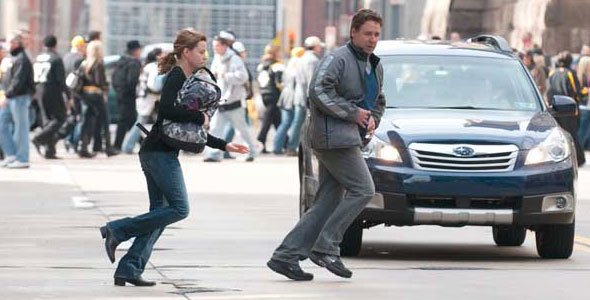
What about that fire truck?
Crowe: We were parked. We were back at the number one position for a shot we’d done a number of times already and we’re just sitting there waiting for the police to tell us when we could go on another circuit and then next thing you know this fire truck sort of comes up behind us and just before it hit I went, ‘Oh, dear.’ [Laughs] And the guy does this turn and takes out the front of the vehicle. I mean actually took off the front of the vehicle.
Haggis: He was only going about five miles an hour, but it did take off the front of the car.
Crowe: We were in a little SUV and he was in a fire truck so he was going to win.
Banks: [Laughs] And he did.
Were you hurt?
Banks: No, no one was hurt.
Crowe: We weren’t hurt. We spent about an hour laughing. And all the other fireman came out and said, ‘Who did that?’ ‘Well, it would be Dooley.’ It’s like, if this guy’s got a reputation, don’t let him drive the truck! [Laughs] I got a cap out of it though. My son Tennyson was really obsessed by fire trucks at that time so he was really happy he got a Pittsburgh Fireman hat.
Elizabeth and Russell, what’d you learn about each other doing this movie?
Banks: You go first.
Russell: What I learned about Elizabeth was that she was worth saving. Now follow that bitch! [Laughs]
Banks: Wow! What I learned about Russell was -
Crowe: Let me make some notes for you.
Banks: I know, please do. [Laughs] What I learned about Russell that I could share with you all, I think he was saying that words can be a crutch and for me, Russell was the crutch.
Crowe: Make sure you spell that right.
Paul, how was it shooting in the prison?
Haggis: You should ask Elizabeth about that. They were really open to us, but she was the one who did a lot of the research when she actually got there in the day.
Banks: Well, for me, so much of the character was so fully realized because we were lucky enough to shoot at the Allegheny County Jail. I was put in a cell, they closed the door and after about two minutes I was like, ‘I’m good! I got it! I see why I would never wanted to be in here.’ I got to talk to a lot of inmates. Like myself, they really cared about the authenticity that we brought to it. I was wearing all prison-issued clothes and they’re very scratchy and they’re itchy. I was really fascinated by everybody’s little attempts on a moment-by-moment basis to capture every little sense of freedom. The pants I wore have an elastic waistband that was horrible and cut into me and everyday at the end of the first few days I had all these marks around my stomach from wearing them. And so when I was sitting with the inmates, I said, ‘How do you guys deal with this?’ They’re like, ‘We cut ‘em open and we make them all drawstrings.’ I remember going to the costume designer and saying, ‘You know, authentically these could be drawstring.’ So what was really great for me was just figuring out all of those little authentic things that they do.
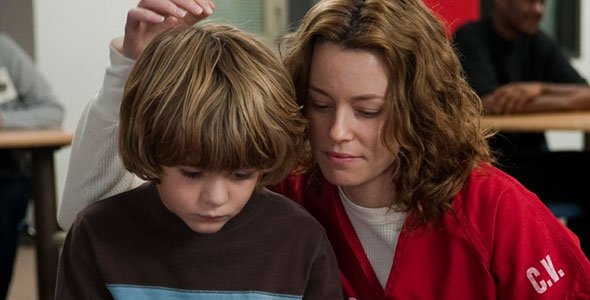
The characters felt much more important than the actual event of escaping and at the end seem really alone. Can you tell us a little about this?
Haggis: I think that’s what we’re saying. Everyone wants to go to a movie like this and wants a happy ending and so we almost create our own ending as we go through as the audience despite what we show you. At different times through the movie we tend to just say, ‘Okay, that’s not that really happening,’ because we’re just too uncomfortable. We always wanted to ask the question, would you save the woman you loved if you knew that by doing so [you] could quite possibly turn into someone she could no longer love? American films, I think, and I think because of American films, French films, other films are mostly morality tests, the good ones I think because you just don’t go out a commit a crime like this or turn yourself into someone like a criminal without you paying a price. That price can be something [like] you could lose your wife, you can lose your child, you can lose who you are and you’re not sure so much what he’s going to lose, but you know he’s going to lose something.
Crowe: There’s real insight in your question because the end is the beginning, isn’t it? They have to learn who they are now.
So you’ll do a second movie.
Crowe: [Laughs] The Next Four Days. See how clever Paul is? He’s got scripts all the way up to 365.
Haggis: Actually, if you look at the film, you’ll see the titles of the film cover over the last three years, the last three months, the last three days. I called it The Next Three Days because I was interested in what was going to happen after the film.
Russell, working with a writer-director like Paul with a very specific view, do you have to change your approach to the film?
Crowe: It’s actually a real bonus when the writer is the director because if something becomes apparent to you that hasn’t been covered or whatever or there is a question then because he’s actually constructed it you tend to get a conversation on that particular thing going a lot quicker and sharper. But I was a big fan of Crash. I really love Crash, so when this script was sent to me that was one of the reasons I read it because of my respect for his earlier work. In simple terms, we had a really easy, fluid relationship, so hopefully we’ll do something else again.
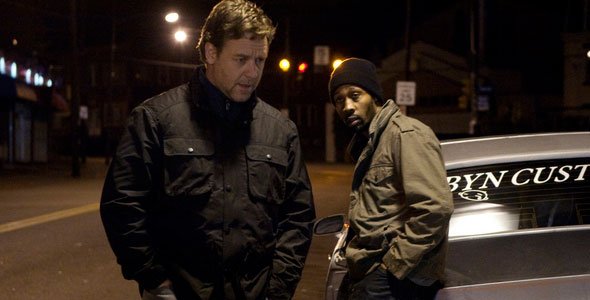
Can you talk about the character parts because a number of them stand out from Liam Neeson to Daniel Stern to RZA?
Crowe: Well, RZA’s one of the coolest guys I know. He has a real individual perspective on life, so we get on really well. He’s just a very very natural excellent actor. We spent a lot of time together on American Gangster and when Paul said he was going to cast him in this I was really happy. It was a real sense of enjoyment for me that those actors were coming in because a lot of this film, as it’s being pointed out, is just me in a room filing down a key, so once a week basically I think it was, I had Liam Neeson come in then Daniel Stern was coming in then Brian Dennehy’s coming in, so it was great to have those things to anticipate and look forward to.
How was it acting with the young boy that plays your son? Is it tough to play a dad on screen and in real life?
Crowe: It’s not tough, no, but Ty Simpkins is his name and he’s a really good little actor and, as I was talking about before, there was a large geographical distance between me and my own kids so that played a real part in just the atmosphere that was around me at the time of making the film. We sort of found out from day one that we communicated really easily, so it was really enjoyable. I’ve been very lucky in that respect. I’ve had a lot of movies where I’ve had kids in the film, I’ve been really lucky to come across some great little actors and he’s one of them.
Elizabeth, can you talk about relating to him from a mother’s point-of-view?
Banks: I adored that little munchkin. I really wanted to get back to him for sure. He was very very sweet and I was the same, just so grateful that we had this little angel that we all got along great with and who was just beautiful. We also had these little twins that were really cute too and cried on cue, nonstop, all day. [Laughs]
Haggis: Well, that was actually hysterical because we had that scene in the beginning where they did the break in and the child is supposed to cry and I figured with all of this commotion, the child’s going to cry. While people are breaking into the house with cops everywhere, the child’s going to cry. The child’s crying until I say, ‘Action,’ and then everybody breaks in and the child’s looking around going, ‘Well this is really cool. Wow.’ And I’d say, ‘Cut,’ and he’d go, ‘Wahhh.’ [Laughs] Four or five takes of this. We finally got it, but it was not easy.
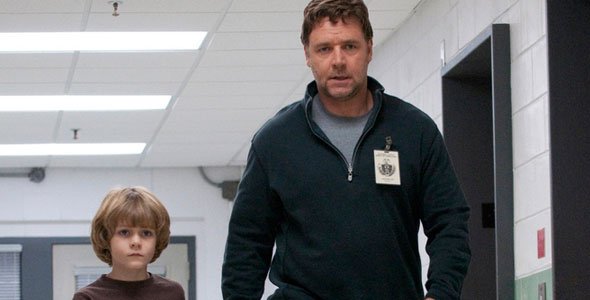
Russell, how does being a father effect your decision when potentially taking a role?
Crowe: It definitely is part of the equation every time you decide to work, is it a place the family can be comfortable and that’s just the way it is. It’s just part of the natural order of things in that respect. But, yeah, this year, for example, there was possibly some things that I might have had a second conversation about, but having been away from Australia and away from the family as much as I was last year, I just didn’t want to be this year. And I’m in that sort of schedule at the moment that a lot of parents find themselves in. I take my boys to school in the morning and then there’s a couple of hours in the middle of the day and then I’ve got to be ready to go and pick them up. And then you go through the bath time, dinner time and then bed time stories, so after eight o’clock there’s really not enough hours in the day to engage yourself in anything creative. [Laughs] But, finally enough, everything – I have a very busy life in Australia and Venice, too, and involve myself in lots of different things, football teams and what have you, so I’m actually really enjoying the simplicity of it.
Staff Writer for CinemaBlend.

